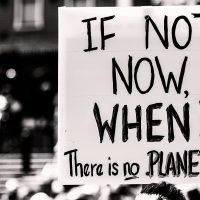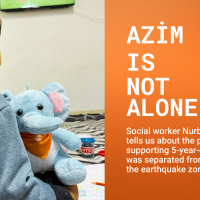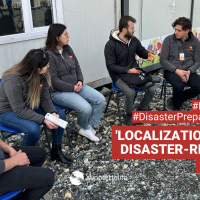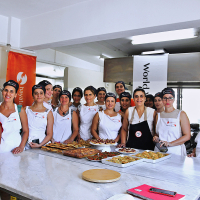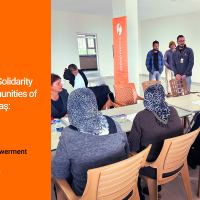The pandemic has made daily life challenging for all of us, but for some, its effects have been devastating. Nurulayn Kavak, a social worker in Adana, talks about the increase in domestic violence she has seen, and the support she has provided to survivors.
My name is Nurulayn Kavak. I have been working on protection activities in Adana for Support to Life (STL) for three years. During that time, I worked on a project that aims to protect women and girls who are exposed to gender-based violence. It is run in partnership with the Danish Refugee Council (DRC) thanks to EU humanitarian funding*.
The pandemic has been a cornerstone of my experience in empowering women. I would like to share with you what I have witnessed and the situation of women during the pandemic. I believe that the experiences we have gained in this process can inform our work in the future.
Increasing Challenges
While working in the humanitarian field, I have witnessed refugee women’s anxiety and fear during my encounters. I listened to many stories and I saw that although the stories differed, violence has always been the same. I saw the traces of what they have gone through on women’s faces.
During the pandemic, women’s faces were replaced by their voices behind the phone. When the first COVID cases began, our primary duty was to contact those in need and identify the changes and emergencies in their lives. In our interviews with women, we learned how unemployment, poverty, isolation and the fear of getting sick affected them.
One of the women helped access social support during the pandemic, Rima (39), explained how her life changed. “When everyone is at home, I have a problem deciding who to help. On one hand, I take care of my disabled mother-in-law. On the other hand, my children are at home and each of them has different needs. Since my spouse has not been working for a while, he is sitting there, waiting for everything to be brought to him. I have a little baby and I sometimes don’t have time to take care of him. I can’t keep track of the hours that I spend doing house chores. I can’t even feel that I get tired.”
Breaking the Cycle of Violence
In addition to women, many girls shared the increasing burden in the household and worked more at home. On top of that, we heard from girls that they were exposed to violence from the men living in the house, especially their elder brothers or fathers who were of the opinion that family female members should do all household chores. Sara (45), a mother of eight children, who was worried about her daughters, shared her experience during the lockdowns: “My children do not go to school anymore because it is closed. I have daughters and I want them to help me with the housework because I can't keep up. When their brothers and father see the girls sitting, they get angry and beat them. I give them tasks so they don’t get beaten up.” Our lawyers got in touch with Sara and her daughters and informed them where they could apply for different programs and how to protect themselves. When Sara decided to leave home with her daughters to get out of this cycle of violence, we stood by her, providing rent support and social services.
Domestic work created an increasing burden for women. Running out of money to meet the increasing needs caused desperation and the lack of a place to escape to from the violence they experienced threatened their lives. It still does. Unfortunately, we have received many calls from women asking for help against gender-based violence in the past two years. Last year, we supported 131 women to break the cycle of violence in Adana only. I think that the support we have provided was very important, especially for women and girls who are subjected to violence, so that they can find safety.
You Are Not Alone
We have widely shared the contact information and emergency hotlines of institutions that women can call in an emergency situation. Our lawyers directed our beneficiaries to the relevant institutions when necessary and provided them with information. Our psychologists supported women to help them cope with the traumas they experienced. In case of special needs, we applied for support to civil society and public institutions that provide relevant services such as medical examination, treatment, different types of vaccination, food assistance, social assistance, rent support, cash support and supermarket cards. We followed the process closely. We reached them on the phone or with text messages and we came together in tele-conference rooms and Zoom screens. We did our best to leave no one behind. Another woman we supported, Safa (47) says: “When the pandemic started, I felt that everyone forgot about us. Nobody called or asked after us, but STL always did. I did not feel alone because you did not forget us and you were with us. I felt stronger.” During that period, we talked to Safa almost every other day. For example, we helped the family get food aid from the municipality and also provided them with psychological support.
I feel empowered as I see women getting stronger and feeling better. We don't just offer services. By offering a supporting hand to women, we are getting stronger and getting better together. We will continue to be there for women. Until we make sure no one is left behind...
* This project is funded by the European Union. The names of our beneficiaries have been changed to protect their personal rights.
Nurulayn Kavak
Social Worker
Editor: Çiğdem Güner
Corporate Communication Expert
Thank you for reading the article and for coming this far. Now you can support life while you are here.



